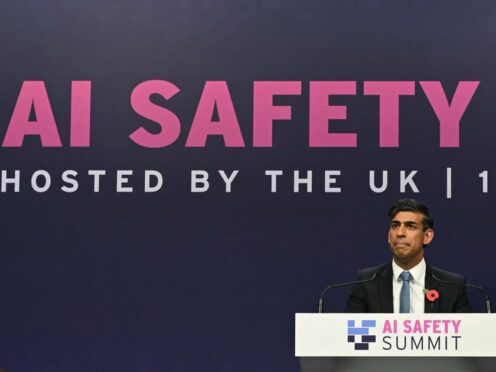
The Government’s AI Safety Institute is to open an overseas office in San Francisco to get closer to the tech giants based in Silicon Valley.
The Department for Science, Innovation and Technology (DSIT) said the new office is expected to open in the summer, and would look to engage with the world’s biggest AI labs, which are based in the region.
The UK’s AI Safety Institute was first announced at the AI Safety Summit at Bletchley Park last year and, alongside several similar international institutes, will carry out research and conduct evaluations of AI models to help inform AI safety policy.
The institute has released its first selection of recent results from safety testing five publicly available advanced AI models, although the institute said it had anonymised the results.
In its findings, the institute said several models had completed cyber security challenges but struggled to complete more advanced challenges, and several models had also shown similar to PhD-level knowledge of chemistry and biology.
The institute said all the models it tested remain highly vulnerable to basic “jailbreaks” to sidestep safety controls, and some will produce harmful outputs even without dedicated attempts to get around safety mechanisms.
The testing also noted that it found models were unable to complete more complex, time-consuming tasks without human oversight.
The announcements come ahead of the AI Seoul Summit, which the UK is co-hosting with South Korea, with Prime Minister Rishi Sunak and Technology Secretary Michelle Donelan taking part along with international counterparts and tech firms.
On the expansion of the AI Safety Institute, Ms Donelan said: “This expansion represents British leadership in AI in action.
“It is a pivotal moment in the UK’s ability to study both the risks and potential of AI from a global lens, strengthening our partnership with the US and paving the way for other countries to tap into our expertise as we continue to lead the world on AI safety.
“Since the Prime Minister and I founded the AI Safety Institute, it has grown from strength to strength and in just over a year, here in London, we have built the world’s leading Government AI research team, attracting top talent from the UK and beyond.
“Opening our doors overseas and building on our alliance with the US is central to my plan to set new, international standards on AI safety which we will discuss at the Seoul Summit this week.”
AI Safety Institute (AISI) chairman Ian Hogarth said its ongoing testing of models would help with the development of better safety controls in the sector.
“The results of these tests mark the first time we’ve been able to share some details of our model evaluation work with the public,” he said.
“Our evaluations will help to contribute to an empirical assessment of model capabilities and the lack of robustness when it comes to existing safeguards.
“AI safety is still a very young and emerging field. These results represent only a small portion of the evaluation approach AISI is developing.
“Our ambition is to continue pushing the frontier of this field by developing state-of-the-art evaluations, with an emphasis on national security-related risks.”

Enjoy the convenience of having The Sunday Post delivered as a digital ePaper straight to your smartphone, tablet or computer.
Subscribe for only £5.49 a month and enjoy all the benefits of the printed paper as a digital replica.
Subscribe